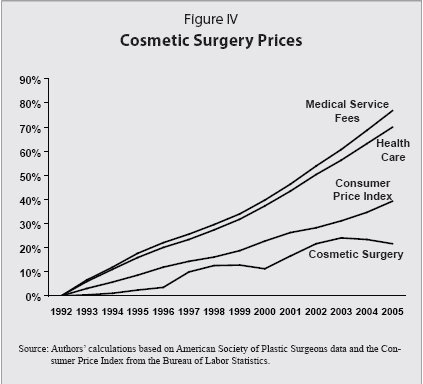You Better Shop Around
This is from Tori Barnett on John Stossel's blog (Stossel being yet another member of the powerful Princeton Tower Club libertarian blogging set):
As we approach ABC's Wednesday White House Health Care town meeting, I'm thinking more about how health insurance"”private or government run"”destroys the individual's incentive to shop around. People spending their own money and dealing directly with doctors is the only thing that honors individuals' different preferences and controls costs. How can we hold costs down at all if the market isn't allowed to work?
But few people are talking about that.
The pundits write about the popularity of Medicare. Of course it's popular. People love getting free stuff. But Medicare is on an unsustainable path. It is more than 30 trillion dollars in the red!
Take purchasing a car. When I need a new car, who determines what car I end up with? Why, I do. And who pays for the car and shops around for a price that makes sense in the context of the perceived value of the car? Why, I do again. The person who uses the car, the person who chooses the type and quality of the car, and the person who pays for the car are all the same person.
This clever procurement model of integrating the payer, the shopper, and the user all into a single individual is one we use for, well, just about every product and service we buy. Milk, Internet service, DVD's, house painting, airline tickets "” all the same model.
OK, lets consider a model that does not work this way. Let's say someone just rear-ended your car and, miracle of miracles, they actually have a good, solid insurance policy that owes you for your car repairs. In this case, you will be consuming the repair services, and have the incentive to find the absolute best, cost-no-object body shop you can find to do the best, most fabulous job fixing your car, because someone else (ie the insurance company) is paying. The insurance company has a different incentive. They want to get off with as small a loss as possible, to protect their profitability as well as keeping prices low for future policy-holders. They are going to want you car fixed cheap, particularly since you are probably not even their customer. They are going to try to deliver the minimum.
No surprisingly, people tend to get ticked off in these situations, as they grind against the opposing incentives of the insurance company. It's one reason that the insurance field is highly regulated (because nowadays people complain to their Congressman whenever they get irritated). It's also a measure of how ineffective regulation is in really managing this friction, since despite zillions of government rules people still get pissed off. The reason is that there is simply no good solution. Both parties want a solution at the extreme end of a cost-value scale, neither have much of an incentive to compromise, and neither will be happy with a solution in the middle of these extreme incentives, and no amount of government fiddling with the tradeoff point is going to change this.
OK, but in this example, at the end of the day, it is just a car, and probably this is a once-in-a-lifetime event. What if we replace "car" with "baby daughter" or "grandmother" or "your life?" Now, as Bill Murray says, the kidding around is pretty much over. It is a recipe for an incendiary disaster. Which is exactly what we have in health care.
If we take these three roles - user, service quality specifyer, and payer/price shopper - there are very few places in medicine today where these three roles are united. Further, despite the fact that the vast majority of the problems in US health care are demonstrably from this role separation, none of the plans currently being considered by Obama or Congress unify these three parties.
With my high deductible medical policy, I am actually one of the few middle/upper class folks who actually shops for health care. And I can tell I am in the minority by the reaction I get from doctors and medical services companies, that look at me like I am from Mars when I ask for detailed pricing, or when I order less than the full and complete battery of potential tests and services based on my own judgment and price/value trade offs. Folks in the medical profession are used to people saying "whatever, the insurance company is paying for it."
The post went on to show data for medical care expenses NOT generally covered by insurance, so that they are paid out of pocket. Not surprisingly, these expenses are the only part of health care seeing actual real price drops:
